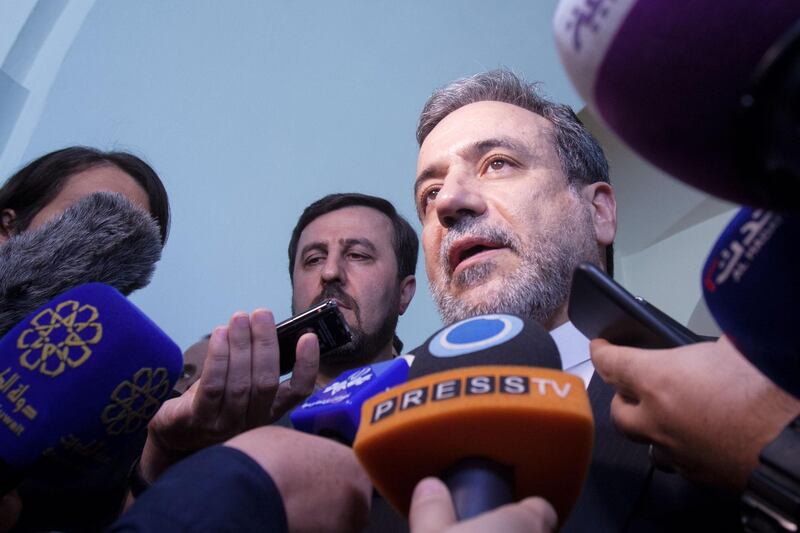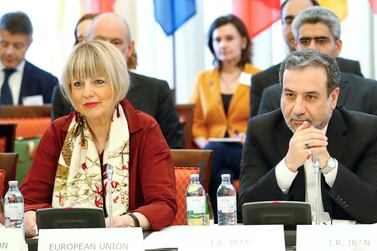European countries offered too little at last-ditch talks on Friday to persuade Iran to back off from its plans to breach limits imposed by its nuclear agreement with world powers, Iran’s envoy said.
A week after Washington abruptly called off air strikes on Iran, diplomats say Tehran is days away from exceeding the maximum amount of enriched uranium allowed under its 2015 nuclear deal with world powers, which Washington quit last year.
The countries that are still parties to the agreement - European powers Britain, Germany and France plus Russia and China - held urgent talks with Iranian officials on Friday in Vienna in hopes of persuading Tehran to hold off.
The Europeans say breach of the agreement by Iran would escalate confrontation at a time when Tehran and Washington are at risk of a miscalculation that could trigger a war.
In a statement the Joint Commission of the Joint Comprehensive Plan of Action (JCPOA) said preservation of the nuclear agreement was "essential for the regional stability and security".
Iran’s envoy, Deputy Foreign Minister Abbas Araqchi, said the talks were “a step forward, but it is still not enough and not meeting Iran’s expectations”.
He said it was ultimately up to his superiors in Tehran to decide whether to call off plans to exceed limits in the nuclear deal, but he did not believe the talks’ outcome was likely to change their minds.
“The decision to reduce our commitments has already been made and we will continue unless our expectations are met,” he said. “I don’t think the progress made today will be enough to stop our process but the decision will be made in Tehran.”
The likelihood that Iran could exceed the deal’s limits as soon as the next few days is the next looming worry for European leaders trying to keep confrontation between Washington and Tehran from spiralling out of control.
Despite abandoning the deal, Washington has demanded European countries ensure Iran comply with it. Iran says it cannot do so unless the Europeans provide it with some way to receive the deal’s promised economic benefits.
In particular, it wants its oil exports restored to the level of April 2018, before Trump abandoned the deal and reimposed sanctions.
French President Emmanuel Macron said this week that he would ask US President Donald Trump to ease sanctions to allow negotiations to begin. But the plea seemed to have fallen on deaf ears, with Trump’s Iran envoy saying on Friday sanctions would remain in place to end Iranian oil exports altogether.
China, long a big importer of Iranian oil, said it rejected US sanctions, but Fu Cong, director general of the Department of Arms Control of the Chinese Foreign Ministry, would not be drawn on whether Beijing planned to keep buying.
So far, European proposals to protect Iran from the impact of US sanctions have failed, with Iran largely shunned in international oil markets and all major companies cancelling plans to invest there for fear of falling afoul of US rules.
After Friday’s talks, Araqchi said he had been informed that INSTEX, a new barter mechanism set up by the Europeans to facilitate some trade with Iran, was now operational.
Britain, France and Germany have informed the EU that INSTEX “had been made operational ... and that the first transactions are being processed,” the EU said in a statement.
However, a European diplomat said that while the system was working on the European side and transactions had been identified, work on the Iranian end had yet to be completed.
Araqchi said the new mechanism would help only if it enables Iran to sell its oil. The Europeans say it is likely to be able to handle only small transactions for items such as medicine, already permitted under sanctions.
The Trump administration argues that the 2015 agreement reached under his predecessor Barack Obama was too weak because many terms are temporary and it excludes non-nuclear issues such as missiles and Iran’s regional behaviour. Washington says the aim of sanctions is to force Tehran to renegotiate.
Tehran says there can be no talks as long as sanctions are in place and Washington is ignoring the deal it already struck.
The confrontation took on a military dimension in recent weeks, with Washington blaming Tehran for attacks on ships in the Gulf, which Iran denies.
Iran shot down a US drone last week, saying it had entered its air space.
Washington said the drone was in international skies, and Trump ordered, then aborted, retaliatory air strikes on Iranian targets.
Any move by Iran that violated the nuclear deal would put pressure on the Europeans to take sides.
“We want them to stay in the accord, but we won’t accept them messing us around,” a senior European diplomat said.






